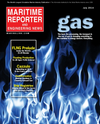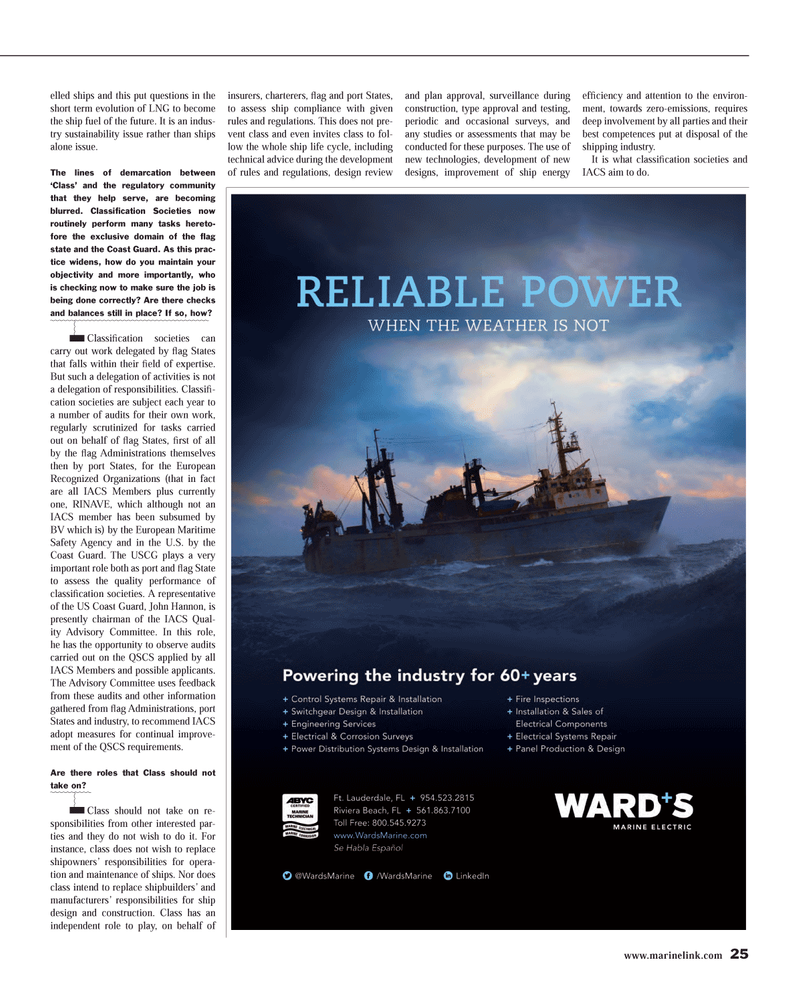
Page 25: of Maritime Reporter Magazine (July 2014)
Offshore Energy Structures & Systems
Read this page in Pdf, Flash or Html5 edition of July 2014 Maritime Reporter Magazine
www.marinelink.com 25 elled ships and this put questions in the short term evolution of LNG to become the ship fuel of the future. It is an indus- try sustainability issue rather than ships alone issue.
The lines of demarcation between ‘Class’ and the regulatory community that they help serve, are becoming blurred. Classifi cation Societies now routinely perform many tasks hereto- fore the exclusive domain of the fl ag state and the Coast Guard. As this prac- tice widens, how do you maintain your objectivity and more importantly, who is checking now to make sure the job is being done correctly? Are there checks and balances still in place? If so, how? Classifi cation societies can carry out work delegated by fl ag States that falls within their fi eld of expertise.
But such a delegation of activities is not a delegation of responsibilities. Classifi - cation societies are subject each year to a number of audits for their own work, regularly scrutinized for tasks carried out on behalf of fl ag States, fi rst of all by the fl ag Administrations themselves then by port States, for the European
Recognized Organizations (that in fact are all IACS Members plus currently one, RINAVE, which although not an
IACS member has been subsumed by
BV which is) by the European Maritime
Safety Agency and in the U.S. by the
Coast Guard. The USCG plays a very important role both as port and fl ag State to assess the quality performance of classifi cation societies. A representative of the US Coast Guard, John Hannon, is presently chairman of the IACS Qual- ity Advisory Committee. In this role, he has the opportunity to observe audits carried out on the QSCS applied by all
IACS Members and possible applicants.
The Advisory Committee uses feedback from these audits and other information gathered from fl ag Administrations, port
States and industry, to recommend IACS adopt measures for continual improve- ment of the QSCS requirements.
Are there roles that Class should not take on? Class should not take on re- sponsibilities from other interested par- ties and they do not wish to do it. For instance, class does not wish to replace shipowners’ responsibilities for opera- tion and maintenance of ships. Nor does class intend to replace shipbuilders’ and manufacturers’ responsibilities for ship design and construction. Class has an independent role to play, on behalf of insurers, charterers, fl ag and port States, to assess ship compliance with given rules and regulations. This does not pre- vent class and even invites class to fol- low the whole ship life cycle, including technical advice during the development of rules and regulations, design review and plan approval, surveillance during construction, type approval and testing, periodic and occasional surveys, and any studies or assessments that may be conducted for these purposes. The use of new technologies, development of new designs, improvement of ship energy effi ciency and attention to the environ- ment, towards zero-emissions, requires deep involvement by all parties and their best competences put at disposal of the shipping industry.
It is what classifi cation societies and
IACS aim to do.
MR #7 (18-25).indd 25 6/30/2014 10:15:33 AM

 24
24

 26
26
